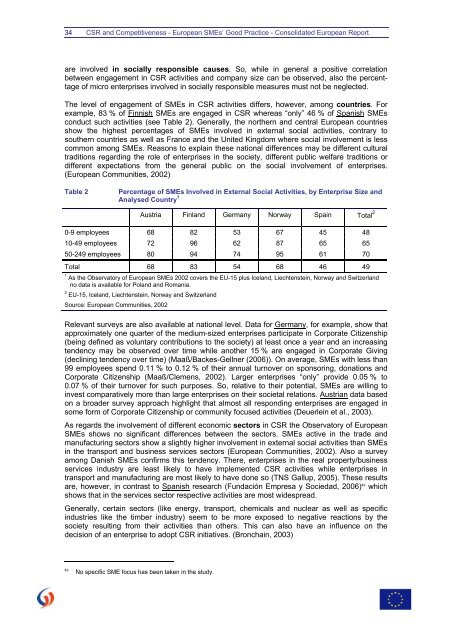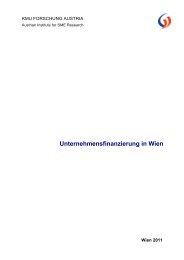CSR and Competitiveness European SMEs - KMU Forschung Austria
CSR and Competitiveness European SMEs - KMU Forschung Austria
CSR and Competitiveness European SMEs - KMU Forschung Austria
You also want an ePaper? Increase the reach of your titles
YUMPU automatically turns print PDFs into web optimized ePapers that Google loves.
34 <strong>CSR</strong> <strong>and</strong> <strong>Competitiveness</strong> - <strong>European</strong> <strong>SMEs</strong>’ Good Practice - Consolidated <strong>European</strong> Report<br />
are involved in socially responsible causes. So, while in general a positive correlation<br />
between engagement in <strong>CSR</strong> activities <strong>and</strong> company size can be observed, also the percenttage<br />
of micro enterprises involved in socially responsible measures must not be neglected.<br />
The level of engagement of <strong>SMEs</strong> in <strong>CSR</strong> activities differs, however, among countries. For<br />
example, 83 % of Finnish <strong>SMEs</strong> are engaged in <strong>CSR</strong> whereas “only” 46 % of Spanish <strong>SMEs</strong><br />
conduct such activities (see Table 2). Generally, the northern <strong>and</strong> central <strong>European</strong> countries<br />
show the highest percentages of <strong>SMEs</strong> involved in external social activities, contrary to<br />
southern countries as well as France <strong>and</strong> the United Kingdom where social involvement is less<br />
common among <strong>SMEs</strong>. Reasons to explain these national differences may be different cultural<br />
traditions regarding the role of enterprises in the society, different public welfare traditions or<br />
different expectations from the general public on the social involvement of enterprises.<br />
(<strong>European</strong> Communities, 2002)<br />
Table 2 Percentage of <strong>SMEs</strong> Involved in External Social Activities, by Enterprise Size <strong>and</strong><br />
Analysed Country 1<br />
<strong>Austria</strong> Finl<strong>and</strong> Germany Norway Spain Total 2<br />
0-9 employees 68 82 53 67 45 48<br />
10-49 employees 72 96 62 87 65 65<br />
50-249 employees 80 94 74 95 61 70<br />
Total 68 83 54 68 46 49<br />
1<br />
As the Observatory of <strong>European</strong> <strong>SMEs</strong> 2002 covers the EU-15 plus Icel<strong>and</strong>, Liechtenstein, Norway <strong>and</strong> Switzerl<strong>and</strong><br />
no data is available for Pol<strong>and</strong> <strong>and</strong> Romania.<br />
2<br />
EU-15, Icel<strong>and</strong>, Liechtenstein, Norway <strong>and</strong> Switzerl<strong>and</strong><br />
Source: <strong>European</strong> Communities, 2002<br />
Relevant surveys are also available at national level. Data for Germany, for example, show that<br />
approximately one quarter of the medium-sized enterprises participate in Corporate Citizenship<br />
(being defined as voluntary contributions to the society) at least once a year <strong>and</strong> an increasing<br />
tendency may be observed over time while another 15 % are engaged in Corporate Giving<br />
(declining tendency over time) (Maaß/Backes-Gellner (2006)). On average, <strong>SMEs</strong> with less than<br />
99 employees spend 0.11 % to 0.12 % of their annual turnover on sponsoring, donations <strong>and</strong><br />
Corporate Citizenship (Maaß/Clemens, 2002). Larger enterprises “only” provide 0.05 % to<br />
0.07 % of their turnover for such purposes. So, relative to their potential, <strong>SMEs</strong> are willing to<br />
invest comparatively more than large enterprises on their societal relations. <strong>Austria</strong>n data based<br />
on a broader survey approach highlight that almost all responding enterprises are engaged in<br />
some form of Corporate Citizenship or community focused activities (Deuerlein et al., 2003).<br />
As regards the involvement of different economic sectors in <strong>CSR</strong> the Observatory of <strong>European</strong><br />
<strong>SMEs</strong> shows no significant differences between the sectors. <strong>SMEs</strong> active in the trade <strong>and</strong><br />
manufacturing sectors show a slightly higher involvement in external social activities than <strong>SMEs</strong><br />
in the transport <strong>and</strong> business services sectors (<strong>European</strong> Communities, 2002). Also a survey<br />
among Danish <strong>SMEs</strong> confirms this tendency. There, enterprises in the real property/business<br />
services industry are least likely to have implemented <strong>CSR</strong> activities while enterprises in<br />
transport <strong>and</strong> manufacturing are most likely to have done so (TNS Gallup, 2005). These results<br />
are, however, in contrast to Spanish research (Fundación Empresa y Sociedad, 2006) 49 which<br />
shows that in the services sector respective activities are most widespread.<br />
Generally, certain sectors (like energy, transport, chemicals <strong>and</strong> nuclear as well as specific<br />
industries like the timber industry) seem to be more exposed to negative reactions by the<br />
society resulting from their activities than others. This can also have an influence on the<br />
decision of an enterprise to adopt <strong>CSR</strong> initiatives. (Bronchain, 2003)<br />
49 No specific SME focus has been taken in the study.




